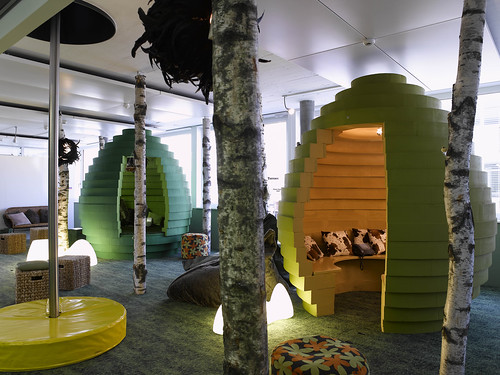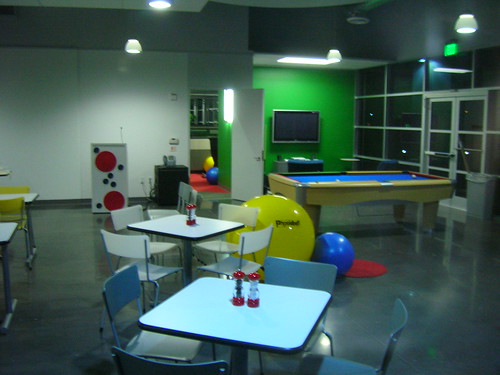I really don’t know how I missed this UFO sighting, but Google’s offices in Zurich are surrealistic and look almost hallucinogenic. This one looks like a scene out of the SciFi film, “Invasion of the Pod People“:
I’m well aware of Google’s penchant for whimsical office environments — not only have I seen some of the offices at Google Headquarters a few times, but I also covertly photographed the Google Radio offices here in Dallas-Fort Worth, back when they opened next to my office at Superpages:
Google loves to make their offices playful, giving them a happy, enjoyable atmosphere. They often incorporate bright, primary colors of red, blue, and yellow, which calls to mind their logo colors.
Some have referred to Google’s Headquarters in Mountain View disparagingly as “daycare for IT workers”, but that mostly sounds like there’s an element of jealousy involved. Their facilities seem cool, and have some advantages over the traditionally staid, mind-numbing and dehumanizing honeycombs of cubicles which sometimes feel more like prisons for corporate drones.
Research has shown that one’s environment affects one’s mood and productivity. Even more obviously, one will be more inclined to spend more time in an enjoyable environment versus an environment that makes one feel bad. At the beginning of the film, Joe Versus The Volcano, the protagonist expresses just how much he feels that his office building draining away his health each day:
Some of the hallmarks of typical corporate work environments include treating all employees identically with stultifyingly homogenous desks and cubicles, and rules which disallow employees from expressing individuality or decorating their cubes to fit their personalities. It’s certain that this insistent devaluation of the individual depresses employees frequently, or causes hostility and resentment — aspects which HR policy rarely ever takes into account.
Another film which perfectly channels the corporate employee zeitgeist is Office Space, where the protagonist forcibly customizes his own cubicle, removing one of its walls which completely blocks him off from a window overlooking the outside of the building (scene appears in trailer at approx 39 seconds):
The Industrial Revolution and factory-style production methods brought with it a tendency to treat people uniformly, almost like cogwheels in company machinery or like robots. The sentiment was expressed perfectly in a prophetic SciFi film way back in 1927 — Metropolis. The “Moloch” scene in Metropolis shows us a situation where downtrodden human workers are placed into mind-numbing jobs as part of a literal corporate machinery where they’re overworked and fatigued until the machinery itself kills them. The protagonist envisions that the corporate machine is a modern equivalent of the pagan god, Moloch, now eating sacrificed workers mindlessly:
Watching the film sequence, you’re hit over the head with the symbolism and its modern-day equivalents where dedicated company employees toil away for decades in uncaring environments and are easily replaced like commodities if it’s convenient to the company. This is probably what is so attractive about Google’s Zurich and other offices — they’re implicitly stating that the employees and individuality are actually important to them.
Considering how unhappy it makes people to all be treated identically and forced like square pegs into round holes, Google’s interest in making fun and pleasing workplaces shouldn’t be all that shocking after all. In fact, it’s kind of sad that their offices are the exception, rather than the rule, and that their funky cubes seem so alien to us.
(To see more of Google’s kooky Zurich office photos, check out their Picasa account.)
Tags: corporate culture, corporate life, Futurism, Google, metropolis, office cubes, office cubicles, office space





 ShareThis
ShareThis
The mind of Chris Smith……. it speaks the truth!
I have always admired Google for daring to be different and really focus on creating a creative environment for employees! The day care and lunches don’t hurt morale either!
[…] Nodal Bits […]